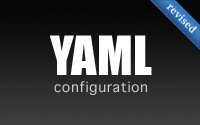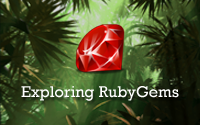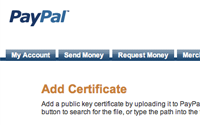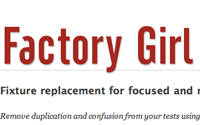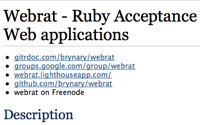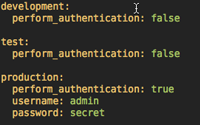Categories
- Active Record
- Active Resource
- Active Support
- Administration
- Ajax
- APIs
- Authentication
- Authorization
- Background Jobs
- Caching
- Code Walkthrough
- Controllers
- Debugging
- Deployment
- eCommerce
- Forms
- Mailing
- Models
- Performance
- Plugins
- Production
- Rack
- Rails 2.0
- Rails 2.1
- Rails 2.2
- Rails 2.3
- Rails 3.0
- Rails 3.1
- Rails 3.2
- Rails 4.0
- Refactoring
- Routing
- Search
- Security
- Testing
- Tools
- Views
YAML Configuration (revised)
Keeping passwords and secret tokens in source control is a security risk. Here I show how to move these settings out into a YAML configuration file which can be loaded in as a hash or environment variables.
(8 minutes)
Exploring RubyGems
RubyGems can make it easy to add a feature to a Rails application, but it can also cause headaches down the road. Here I give some tips on researching gems to decide which one to choose, or when to do it from scratch.
(7 minutes)
Facebook Open Graph
This episode builds on last week's episodes and shows how to integrate Facebook further through the Open Graph protocol. You will also learn how to tunnel your local server and move Facebook communication into a background process.
(11 minutes)
Facebook Graph API
Learn how to use the Facebook Graph API with the Koala gem to fetch data from Facebook and post content through a user. Here I delve into permissions, error handling, and more.
(14 minutes)
Factories not Fixtures (revised)
Fixtures are external dependencies which can make tests brittle and difficult to read. In this episode I show how to use Factory Girl to generate the needed records directly in the tests.
(9 minutes)
Sending HTML Email
HTML email can be difficult to code because any CSS should be made inline. Here I present a few tools for doing this including the premailer-rails3 and roadie gems.
(5 minutes)
PayPal Security
This episode shows how to encrypt the variables passed to PayPal and verify the authenticity of the payment notifications (IPN).
(11 minutes)
Factories not Fixtures
Fixtures are external dependencies which can make tests brittle and difficult to read. In this episode I show a better alternative using factories to generate the needed records.
(12 minutes)
Webrat
If you prefer writing integration tests in ruby instead of Cucumber's plain english, consider interacting with Webrat directly as I show in this episode.
(7 minutes)
YAML Configuration File
Application configuration shouldn't be spread throughout your code base. Instead a much better place to put it is an external YAML file. See how to do that in this episode.
(7 minutes)

